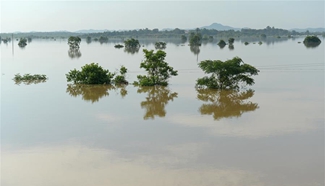GAZA, June 21 (Xinhua) -- Gaza has been blockaded for decade and Gazans live in misery since Gaza military groups captured the Israeli soldier Gilad Shalit from his tank in a cross-border raid southeast of the Gaza Strip in June 2006.
According to the Gaza-based Health Ministry's figures, around 1,500 children were born in Gaza since 2006, a year which was significant and a turning point in the history of the conflict between Israel and the Palestinians.
The parents of Saleh said since 2006, life in Gaza has been miserable.
The boy Saleh and his family, who live just several hundred meters away from the borderline area, have undergone the worst-ever ten years in their life. They witnessed three large-scale wars Israel waged on the Gaza Strip in late 2008, 2012 and 2014 respectively.
The smiling boy, who still suffers from nightmares and bedwetting due to the wars, said "They (Israel) destroyed my house and my bedroom. I need to get my toys back because I like playing."
Although Shalit was released in a prisoner swap deal reached between Israel and Islamic Hamas movement in October 2010, the living conditions in Gaza have continued worsening due to a tight blockade Israel has imposed on the impoverished coastal enclave since 2006.
Amjad al-Kheisi, the 48-year-old father of ten children, said his life began to get harder in 2003 when the Israeli security forces informed him that he wouldn't be allowed to work in Israel anymore for security reasons. "Before 2003, I worked in Israel in the sector of construction, and my life was good then," he said.
"After I was prevented from working in Israel, I worked in Gaza in the field of construction until the kidnapping of Gilad Shalit, when the borders and the crossing points between Gaza and Israel were closed and construction raw materials were not allowed to be shipped into the enclave," the father said.
Following the abduction of Shalit, Amjad and his younger brother who live together in the same building remained totally unemployed.
In June 2007, when Hamas movement violently seized control of the Gaza Strip, Israel tightened its blockade, fully closing all border crossing points and considering the coastal enclave as a hostile entity.
In December 2008, Israel launched a three-week massive air and ground attack on the Gaza Strip to rein in its militant groups, mainly Hamas movement, such as deterring them from firing rockets into Israel. More than 1,400 Palestinians were killed and 5,000 injured.
In 2012, Israel waged an 8-day large-scale air strike on the enclave and killed Hamas military commander Ahmed al-Ja'bari. In 2014, Israel launched the largest-ever military operation on Gaza which lasted for 50 days, killing more than 2,200 Palestinians and wounded more than 11,000.
"In each war, I used to escape from my house with my wife and children, staying at houses of our relatives and friends and then when the wars were over, we returned to our home. During each war, our house was badly damaged, but in the last war in 2014, our house was completely destroyed," said Amjad.
The al-Kheisi family are not the only Gazans who have suffered worsening living conditions during the past decade. Official figures showed tens of thousands of the coastal enclave civilians have fallen prey to the wars.
Adnan Abu Hasna, the Gaza media advisor of the United Nations Relief and Works Agency for Palestine Refugees in the Near East (UNRWA), said since the abduction of Shalit and the Israeli siege on the Gaza Strip, the humanitarian situation there has spiralled downward.
"Rate of unemployment due to the Israeli blockade has gradually went from 25 percent before 2006 up to 45 percent now and rate of poverty grew up to more than 50 percent," Abu Hasna told Xinhua.
"After the Israeli war on Gaza in 2014, around 80 percent of Gaza populations began to receive humanitarian aid," he added.
When asked about how to feed his wife and his ten children, Amjad said international aid organizations provide him 50 kg of flour every month to make bread and pay him 1,800 Israeli Shekels (about 370 U.S. dollars) every three months.
"I don't want just food and money which are not a big deal for me. Our life has become so miserable during the past ten years," said Somaya al-Kheisi, the mother of the boy. "All what I'm dreaming about is to rebuild our destroyed house and be able to provide better living conditions to our children."
Talal Oukal, a political analyst from Gaza, told Xinhua that life in the Gaza Strip was relatively good before 2006, "but after Shalit was kidnapped, it seems that this young man has a curse because since he was kidnapped and after he was freed, Gaza has never seen one good day in the past 10 years."










